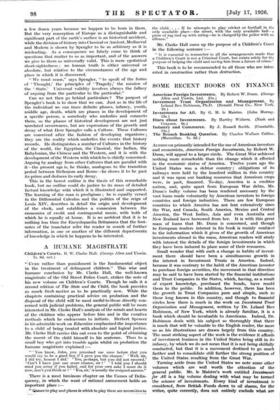A HUMANE MAGISTRATE
" CURE rather than punishment is the fundamental object in the treatment of delinquent children." This wise and
humane conclusion by Mr. Clarke Hall, the well-known Magistrate of the Old Street Police Court, strikes the note of his new volume on Children's Courts. Though he calls it a second edition of The State and the Child, the book provides so much fresh matter as to be practically new. While the chapters containing practical advice on probation and the disposal of the child will be most useful to those directly con- cerned with judicial problems, the general public will be more interested in Mr. Clarke Hall's analysis of the minds and hearts Of the children who appear before him and in the curative methods which he endeavours to initiate. Herbert Spencer in his admirable work on Education emphasized the importance to a child of being treated with absolute and logical justice. Mr. Clarke Hall carries this out even to the point of obtaining the assent of the child himself to his sentence. Thus to a small boy who got into trouble again whilst on probation the humane magistrate explained :—
" ' You know, John, you promised me once before that you would try to be a good boy if I gave you the chance." Well, sir, I did try, honest I did.' `Yes, perhaps, but you did not succeed.' `.Can't I have just one more chance, sir T " I told you I should send you away if you failed. and for your own sake I must do it now, don't you think so ? " Yes, sir,' is usually the resigned answer."
There is a most luminous chapter on the Causes of Delin- quency, in which the want of rational amusement holds an important place " Games to play and places in which to play thorn arc necessities to the child. . . . If he attempts to play cricket or football in the only available place—the street, with the only available ball—a piece of rag tied up with string—he is charged by the police with an offence."
Mr. Clarke Hall sums up the purpose of a Children's Court in the following sentence :—
" It is essential to remember in all the-arrangements made that a Children's Court is not a Criminal Court, but exists solely for the purpose of helping the child and saving him from a future of crime."
This book is to be recommended to all those who are inter. ested in construction rather than destruction.










































 Previous page
Previous page